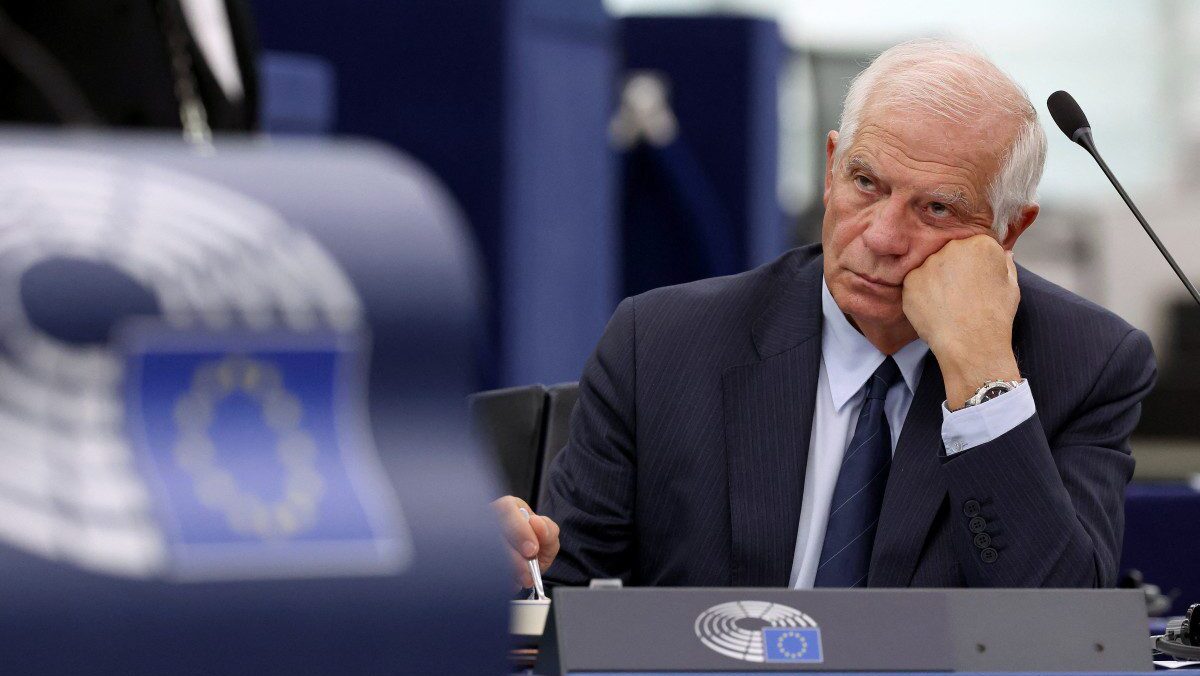
EU High Representative for Foreign Policy Josep Borrell listens to Commission President Ursula von der Leyen’s speech about the Israel-Hamas war in Strasbourg, October 17th.
Photo: FREDERICK FLORIN / AFP
EU foreign affairs chief Josep Borrell called for faster aid deliveries and a temporary ceasefire in Gaza after meeting the bloc’s also divided foreign ministers on Monday, October 23rd, a day after Commission President Ursula von der Leyen doubled down on supporting Israel in a speech in Germany, despite the public criticism from rebellious EU staffers.
According to Borrell, the dozens of trucks worth of EU humanitarian aid allowed into Gaza by Egypt is “not enough,” and Brussels should also start providing fuel for the electricity and desalination plants inside the Strip.
Furthermore, the official urged both sides to consider an immediate temporary ceasefire as a “humanitarian pause” in the conflict while internal refugees are taken care of and aid is properly distributed.
The majority position of the member states did not change, Borrell explained, saying that EU governments continue to condemn terrorism but stressed that the solution is seen in Palestinian statehood and in the immediate end of Israeli atrocities.
“Yes, we support the two-state solution, and yes, we believe the right to self-defense has limits—the limit is international humanitarian law,” Borrell said. “The humanitarian situation is very dire—it’s not me who has to explain this when you can watch this on any TV screen.”
Many of the bloc’s foreign ministers also echoed Borrell’s statements. “The degree of suffering—innocent civilians in Gaza are suffering—it’s not acceptable at all and in our view, that’s why we believe a humanitarian pause is required,” Irish FM Micheal Martin said.
German foreign minister Annalena Baerbock said the fight against terrorism was essential, but stressed that “everything must be done to alleviate the unbelievable suffering of the two million people in Gaza.”
At the same time, others believed the idea of a temporary ceasefire was absurd without Hamas’ active participation.
“There is a terrorist organization controlling Gaza, sending rockets every day, that perpetrated barbarous attacks on Israeli territory,” Czech Foreign Minister Jan Lipavsky said, adding that the question is how to establish such a pause, involving both sides.
Italian Foreign Minister Antonio Tajani put it more bluntly: “We cannot tell Israel to stop defending itself when Hamas is firing missiles at its cities.”
EU leaders will meet for a Council Summit to agree on a high-level joint position next week, but the final text is expected to be much more carefully worded to garner unanimous support.
Nonetheless, this press conference once again highlighted the growing division within the EU leadership about the conflict. Unlike Borrell—who received praise from Arab countries for taking Palestine’s side— von der Leyen keeps reassuring Israel of the EU’s “unequivocal” support, prompting criticism from member states, MEPs, and even her own staff.
After giving a speech in Washington last Thursday, in which she did call for respecting international law but did not even mention the two-state solution, von der Leyen received a joint letter signed by nearly 850 EU staffers who condemned their boss’ alleged pro-Israel bias.
“Because of [Israel’s] atrocities, we are surprised by the stance the European Commission has taken,” the bureaucrats told von der Leyen in their letter. “Notably, we are concerned about the unconditional support by the European Commission you represent, for one of the two parties. … The EU risks losing all credibility.”
Despite these strong words, the Commission President doubled down on her previous position at a CDU gathering in Germany on Sunday, where she called for “solidarity with Israel and providing humanitarian aid to Gaza,” but, once again, without mentioning Palestinian statehood.
